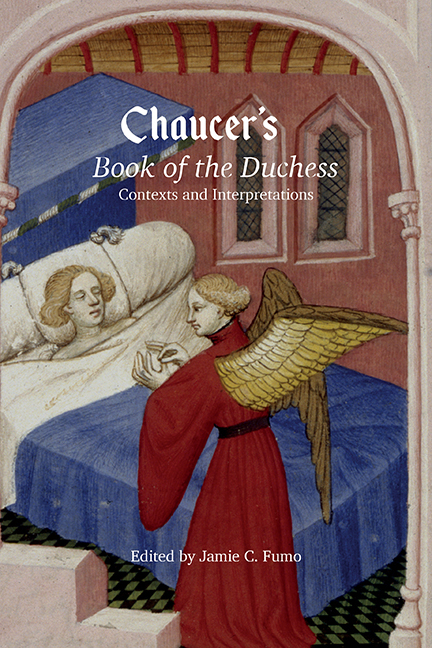Book contents
- Frontmatter
- Contents
- List of Illustrations
- Acknowledgments
- List of Contributors
- Abbreviations and Editions
- Introduction: Reopening the Book of the Duchess
- I Books and Bodies
- II The Intertextual Duchess
- 5 Alcyone's Grave: Inscription and Intertextuality in Chaucer, Spenser, and Ovid
- 6 Tribute to a Duchess: The Book of the Duchess and Machaut's Remede de Fortune
- 7 ‘Hyt am I’: Voicing Selves in the Book of the Duchess, the Roman de la rose, and the Fonteinne Amoureuse
- 8 ‘Counterfeit’ Imitatio: Understanding the Poet-Patron Relationship in Machaut's Fonteinne amoureuse and Chaucer's Book of the Duchess
- 9 The Shock of the Old? The Unsettling Art of Chaucer's Antique Citations
- 10 Response: The Book of the Duchess, Guillaume de Machaut, and the Image of the Archive
- Bibliography
- Index
- Miscellaneous Endmatter
10 - Response: The Book of the Duchess, Guillaume de Machaut, and the Image of the Archive
from II - The Intertextual Duchess
Published online by Cambridge University Press: 18 April 2018
- Frontmatter
- Contents
- List of Illustrations
- Acknowledgments
- List of Contributors
- Abbreviations and Editions
- Introduction: Reopening the Book of the Duchess
- I Books and Bodies
- II The Intertextual Duchess
- 5 Alcyone's Grave: Inscription and Intertextuality in Chaucer, Spenser, and Ovid
- 6 Tribute to a Duchess: The Book of the Duchess and Machaut's Remede de Fortune
- 7 ‘Hyt am I’: Voicing Selves in the Book of the Duchess, the Roman de la rose, and the Fonteinne Amoureuse
- 8 ‘Counterfeit’ Imitatio: Understanding the Poet-Patron Relationship in Machaut's Fonteinne amoureuse and Chaucer's Book of the Duchess
- 9 The Shock of the Old? The Unsettling Art of Chaucer's Antique Citations
- 10 Response: The Book of the Duchess, Guillaume de Machaut, and the Image of the Archive
- Bibliography
- Index
- Miscellaneous Endmatter
Summary
More, it seems, than any other of Chaucer's works, the Book of the Duchess epitomises citation. The density of its textural tissue is noted by many of the contributors to this volume. It is possible to track three-quarters of its lines to other poems, largely French verse narratives. So well known a fact hardly bears repeating; yet there is surprisingly little discussion of what this might mean to our sense of how and why Chaucer composed the poem in this form. For although most of his poems draw directly or indirectly on what have traditionally been called ‘sources’, none does so with quite the kaleidoscopic abandon of the Book of the Duchess over such a concentrated stretch of writing. Traditional source study, by meticulously identifying the detail and range of these borrowings, and labelling them thematically and line by line, has been as distorting as it has been illuminating. We are left puzzling over the simultaneously thick stuff of reference and the minute detail of its cross-hatched character, of the way individual ‘source’ texts seem broken up into pieces and intricately recombined with utter disregard for their original linearity. Chaucer appears to veer from text to text, at one moment through word-by-word translation and at another through large-scale structural amplification or compression, and then back to the word-by-word translation. It's not the allusiveness per se, but the seemingly random character of the citational process that catches our attention.
For this reason, the Book of the Duchess also epitomises why source study fails. A list of parallels does not make sense of either a reading or a composing process. If we were to take the list at face value, then we would have to imagine Chaucer in a great modern library or, as Ruth Evans has wittily described, in cyberspace, as if he had (like his modern critics) too many windows open on his laptop and was cutting and pasting from his internet searches as he wrote. In fact, as Evans also points out, the uncanny (and of course unlikely) appropriateness of this model to Chaucer's compositional methods should not be dismissed too swiftly.
- Type
- Chapter
- Information
- Chaucer's Book of the Duchess , pp. 199 - 212Publisher: Boydell & BrewerPrint publication year: 2018



